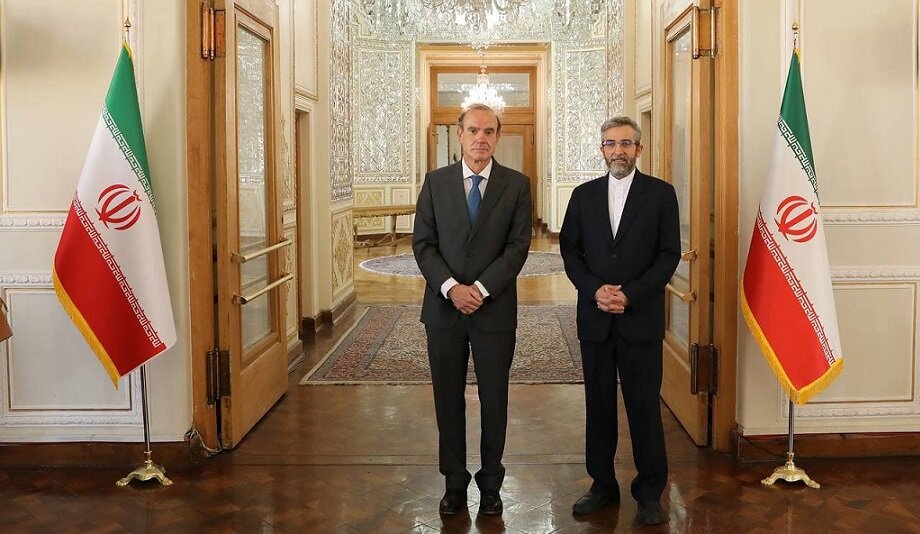
TEHRAN – After long months of dormancy, a flurry of diplomatic efforts by Iran’s top nuclear negotiator has stirred up the stagnant waters of the 2015 nuclear deal between Tehran and major world powers.
On Wednesday, while Tehran was playing host to an important regional meeting on Afghanistan, Iran’s Deputy Foreign Minister Ali Bagheri, who will lead Iran’s negotiating team later next month, was busy meeting European officials to discuss the latest developments surrounding the 2015 nuclear deal, officially known as the Joint Comprehensive Plan of Action (JCPOA).
The senior Iranian diplomat met with Theodora Gentzis, Secretary General of the Foreign Ministry of the Kingdom of Belgium, and Enrique Mora, Deputy Secretary-General of the EU External Action Service. After Brussels, Bagheri went to Moscow and met with his Russian counterpart.
Bagheri said his meeting with Mora was “very serious and constructive” and addressed “the essential elements for successful negotiations.”
He also pointed to a thorny issue that has been the focal point of Iran’s relations with the Europeans, and to some extent the Russians over the last few months. Bagheri said he finally reached an agreement with Mora on when to resume the stalled nuclear talks between Iran and the remaining parties to the JCPOA.
“We agree to start negotiations before the end of November. Exact date would be announced in the course of the next week,” he said on Twitter.
In addition to broadly setting a date for the resumption of the talks, Bagheri also discussed “the effective lifting of sanctions and the adherence of other parties to their commitments under the Iran nuclear deal,” according to a statement by the Iranian foreign ministry.
The mere resumption of the talks, which have been on pause ever since June, has turned into the most important point in the whole JCPOA drama. Iran announced that it will soon return to the talks without setting a specific date for its return. On the other side, the Europeans along with Americans keep pressuring Tehran to quickly resume the Vienna talks. The Russians also joined their colleagues party to in the JCPOA in calling for the quick resumption of the talks.
But the resumption of talks is one thing and the successful conclusion of the talks is another. Despite their insistence on the resumption of the talks, the Americans and their European allies did nothing to pave the way for successfully concluding the talks in case they were resumed.
Bagheri told Mora that Iran experienced several years of negligence in the implementation of the JCPOA and finally the unilateral and illegal withdrawal of the United States from the agreement as well as the inaction of European countries in fulfilling their undertaken commitments.
He pointed out that what is important for Iran is the effective lifting of sanctions and normalization of trade and economic relations between other countries and Iran, and any agreement must meet Iran's demands in this regard.
But even now that a date has been set for the talks, the Europeans and the Americans avoid making any promise to offer a tangible and credible sanctions relief.
As things stand, Iran and the 4+1 group of countries are likely to sit at the negotiating table again in the coming weeks. But this doesn’t mean that resuming the talks is a silver bullet. Quite the opposite, Europe and the United States will likely discover that Washington’s unwillingness to remove the sanctions and its insistence on “lengthening” the JCPOA has made it even more difficult to revive a deal increasingly losing its relevance to Iran and its economy.
In fact, a revived JCPOA could even exacerbate fluctuations in Iran’s economy in the short run because the Biden administration has so far refused to provide a guarantee that the U.S. won’t renege on its commitments under the JCPOA again. Bagheri said Iran will not relinquish its demand for a guarantee that negligence and illegal behavior on part of other sides will not happen again.
Whether Biden is ready to offer such a guarantee will determine the outcome of the next round of talks. Some have claimed that the Biden administration has even refused to guarantee that the U.S. won’t withdraw from the JCPOA during the remaining years of the Biden administration. If true, this will make reviving the JCPOA in the next round a herculean task.
TAGS

No comments:
Post a Comment